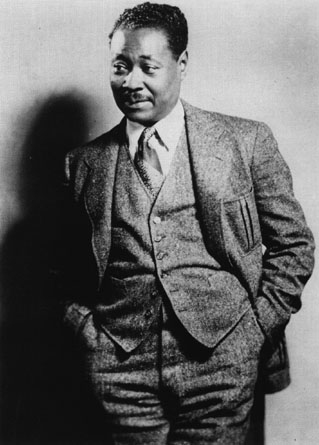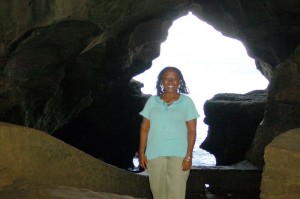In Search of Claude McKay

YardEdge is pleased to welcome this contribution by Jamaican writer Opal Palmer Adisa.
Opal Palmer Adisa has written extensively on a wide range of topics ranging from children’s issues to the environment, in either in poetry, prose or essay. A writer and motivational speaker, Dr. Palmer Adisa has lectured and read her work throughout the United States, Europe, South Africa, South America, and the Caribbean. She is also an award-winning poet and prose writer who has twelve titles to her credit, including the novel, It Begins With Tears (1997).
IN SEARCH OF CLAUDE MCKAY
As I sat outside in one of the central cafés in Tetouan, Morocco in July, the small town an hour plus from Tangiers in which Claude McKay lived during the 1930s, I half hoped to see McKay, his duppy-self, walk up to greet and welcome me as a fellow Jamaican writer, walking the same path he did. I fantasized about meeting someone who would fondly say, “I knew him then, but I was just a little boy, not even coming to his knee.” Or perhaps I would find a tree with his name etched in it, or even more auspicious, a plague proclaiming the fact that he once lived and wrote from here; I half hoped as I walked the streets that perhaps McKay treaded these same streets. But I know the central town of Tetouna where I sat and drank cappuccino was not as modern then as it is today. That when McKay lived here it was a different place, certainly from his travelogue.
That Claude Mckay is one of the greatest writers to come out of Jamaica is a fact, not publicized enough.
That I traveled in a public car with five other men, not speaking either French or Arabic, to Tetouna seeking McKay’s presence is a fact. How did he get here I wondered. Was it a lover he met who invited him to come and see North Africa. Was it a man or a woman? I decided it would be decidedly a man who issued the invitation, if there was an invitation.
That McKay was bi-sexual is also a fact.
And Why Morocco? Did McKay dream about visiting Morocco as a boy or young man growing up in Jamaica as I dreamed about visiting Egypt? Did he plan to visit north African country, or was it just a chance opportunity? Did he see any similarities between Morocco and Jamaica? Did he feel at home there? As a lone black woman, unveiled, I got some stares, some young men fondly hollered at me, “Hello, African woman.” Moroccons do not consider themselves African, at least not related to their darker brothers and sisters from the rest of Africa.
That I knew nothing of McKay while in Jamaica, even though I attended a preparatory school and later one of the best high schools for girls in Jamaica in the late 60’s is also fact.
That I discovered him when I moved to New York while combing through the Harlem writers is also a fact.
That his poem, “If We Must Die” was quoted by Winston Churchill “as a rallying cry to call the British into sustained battle against the Nazi,” is also a fact.
That when I was earning my MA in English & Creative Writing in California in 1980, and I elected to do the required comprehensive essay and oral presentation on McKay as one of the two poets I had to do. However, initially, my advisory said I could not do McKay because he had not heard or read him and therefore he was not a major writer. I protested and brought him proof, and was approved, is also a fact.
That McKay’s “Tropic of New York,” is one of my favorite’s poems because it gives voice to familiar loves, is also a fact.
Bananas ripe and green, and ginger root
Cocoa in pods and alligator pears,
And tangerines and mangoes and grape fruit,
Fit for the highest prize at parish fairs,
Sat in the window, bringing memories
of fruit-trees laden by low-singing rills,
And dewy dawns, and mystical skies
In benediction over nun-like hills.
My eyes grow dim, and I could no more gaze;
A wave of longing through my body swept,
And, hungry for the old, familiar ways
I turned aside and bowed my head and wept.
Claude McKay
That McKay, the youngest child, was born (Sept. 15, 1890, Jamaica; died May 22, 1948), Festus Claudius McKay in Nairne Castle near James Hill, Clarendon, Jamaica to Thomas Francis McKay and Hannah Ann Elizabeth Edwards, well-to-do peasant farmers who had enough property to qualify to vote, is also a fact. That I am also the youngest in my family, and lived in Clarendon for two years, is a fact.
That in 1912, Jamaican Institute of Arts and Sciences, awarded him the gold medal, for two volumes of poetry, Songs of Jamaica and Constab Ballads, both 1912, written in the Jamaican dialect.
That in 1912 McKay left for the U.S. to attend Booker T. Washington’s Tuskegee Institute, and was shocked by the potent racism he encountered is also a fact. That I left Jamaican in 1970 for New York and was surprised by the ignorance and misperception of Jamaica many people had, is also a fact.
That McKay, just like me, read W. E. B. Du Bois’ Souls of Black Folk, which influenced and stirred his political involvement, is also a fact.
That in 1914 McKay decided he did not want to be an agronomist and moved to New York, where he married his childhood sweetheart Eulalie Lewars, is also a fact.
That once in New York he met some of the major writers of the time and was a regular contributor and editor with The Liberator, the leading journal of avant-garde politics and art, and that while there he had affairs with both men and women, is also a fact.
That in 1929, McKay earned the Harmon Foundation Award for distinguished literary achievement, from NAACP, for Harlem Shadows and Home to Harlem, is a celebrated fact. And less that ten years later, 1937, the prestigious James Weldon Johnson Literary Guild Award, is also a fact.
That McKay’s novel, Banjo: A Story without a Plot (1929), and his presence in France influenced Léopold Sédar Senghor, Aimé Césaire, and other pioneers of the Negritude literary movement, is a fact not often mentioned.
That McKay moved to Morocco in 1930, but his financial situation forced him to return to the United States in 1934, is a sad fact.
That McKay did a twelve-year sojourn through Europe, the Soviet Union, and Africa, is also a fact.
Although McKay never returned to Jamaica, that Jamaica was always on his mind, evident by the title of some of his works: Banana Bottom (1933); the first part of his autobiography, A Long Way from Home (1937), and his second My Green Hills of Jamaica (1979), published posthumously, is also a fact.
That McKay in his autobiography, A Long Way from Home, sums up his life thus: “I have nothing to give but my singing. All my life I have been a troubadour wanderer, nourishing myself mainly on the poetry of existence. And all I offer here is the distilled poetry of my experience,” is also a fact.
That similar to McKay, I am a poet, novelist, and journalist, is also a fact.
That McKay looks like my father is a debatable fact.
That I love and respect who and what he was and how despite opposition he lived his life, fiercely and freely, and that he serves as a model for my own life is also a fact.
That like McKay Jamaica remains in my heart and fuels my work is a fact.
And that I too am a traveler and sojourner like McKay, is a fact.
That my search for Claude McKay returns me back home and to self is a wonderful fact to realize.

You can contact Opal Palmer Adisa, Ph.D. via her website www.opalpalmeradisa.com


3 Comments
I have read your work. I love the fact that you went on his trail in Morocco as I did in Marseille last year. I am a big fan of Claude. In February 2020, a long lost novel entitled: Romance in Marseille will be published. I’d like you scholars to dedicate an issue of Caribbean Quarterly or an issue of Anthurium to him and his work. Revive him again. Claude met some of the most interesting political, literary and artistic figures of the last century. Many people seem to over- look him. We must give him a place in history that he truly deserves.
this is a great site and i think its great that you respect him, every one should
Eye opening facts that touch my heart.. We are every where…